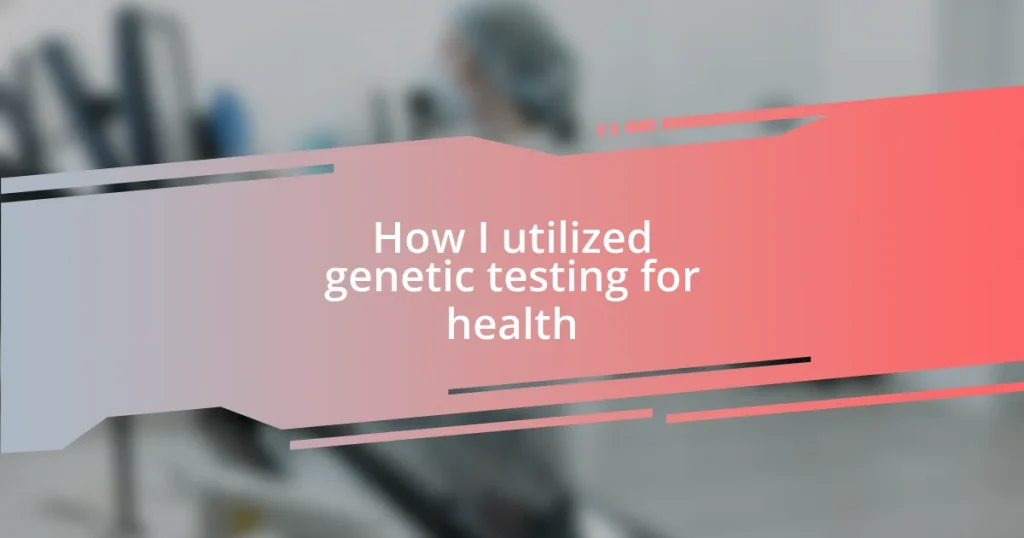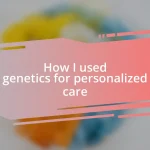Key takeaways:
- Genetic testing empowers individuals by providing personalized health insights, enabling proactive healthcare measures and informed health decisions.
- Choosing the right genetic test involves understanding its purpose, consulting healthcare professionals, and considering privacy, costs, and reputable providers.
- Monitoring health using genetic insights transforms proactive measures into tangible health practices, enhancing awareness and control over one’s health journey.
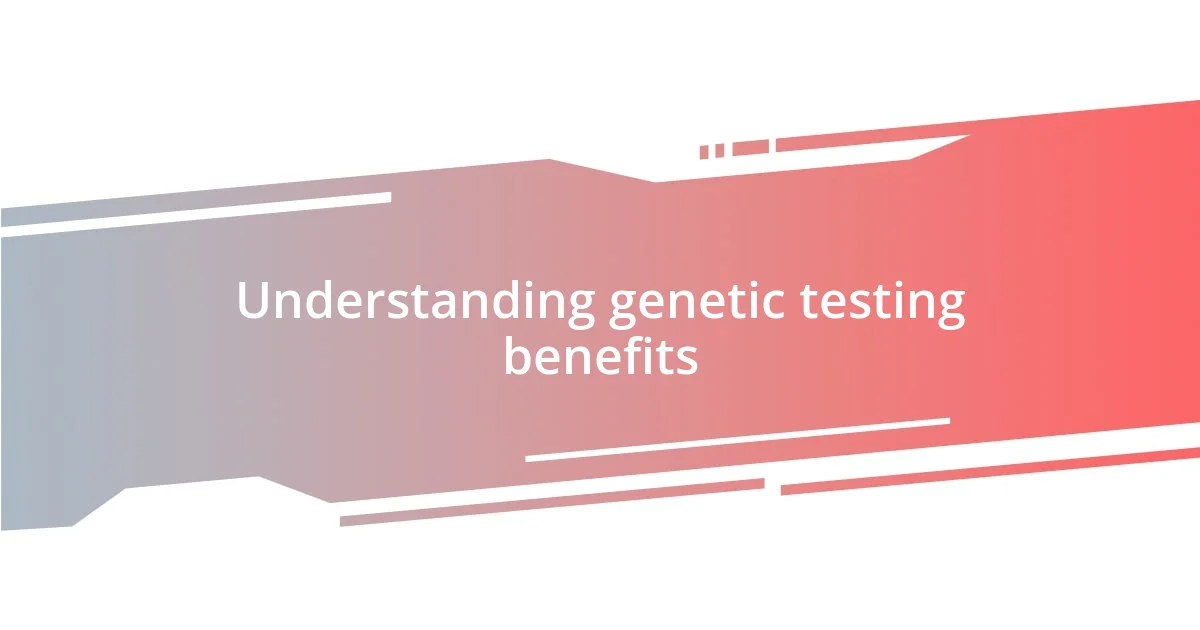
Understanding genetic testing benefits
One of the most significant benefits of genetic testing is its ability to provide personalized health insights. I remember feeling a sense of empowerment when I received my results, knowing that I had a clearer understanding of my health risks. It made me consider how different my health decisions would be if I had this knowledge earlier.
Moreover, genetic testing can lead to proactive healthcare measures. I found myself asking, what if I could catch a potential health issue before it becomes serious? This possibility was particularly compelling for me, as I learned about predispositions to certain conditions, allowing my doctor and me to develop a tailored monitoring plan.
Lastly, the emotional comfort that comes from genetic testing cannot be overlooked. After undergoing my test, I felt a mix of anxiety and relief. Was my family history just a shadow, or was it a reality I needed to prepare for? Ultimately, understanding my genetic landscape allowed me to approach my health with a newfound confidence, transforming uncertainty into proactive choices.
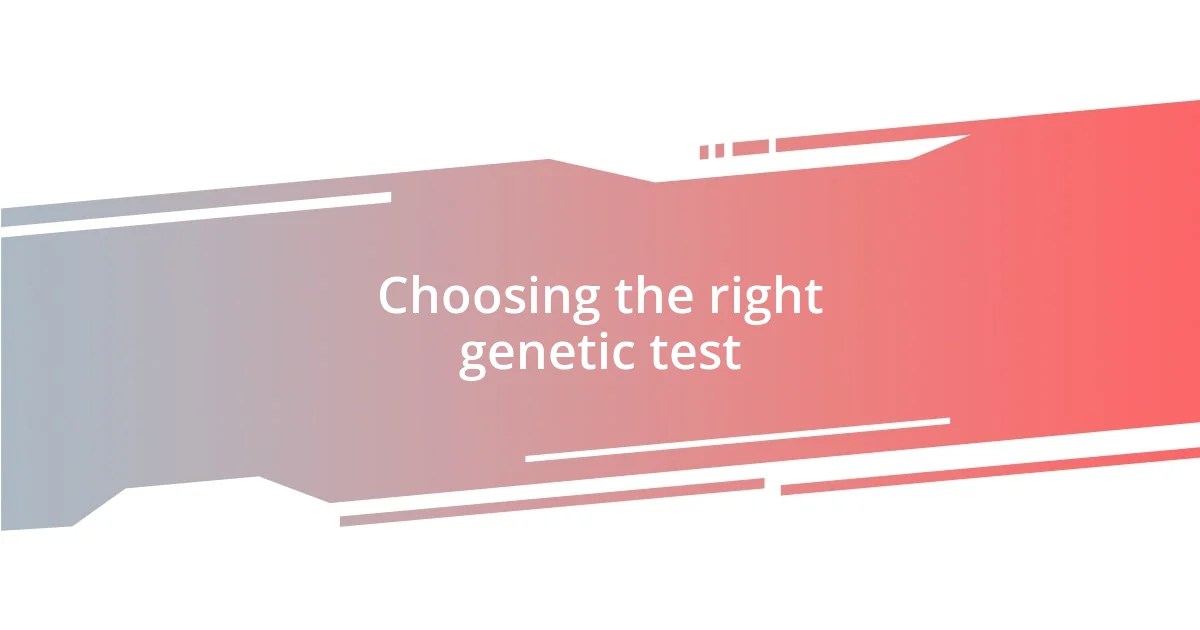
Choosing the right genetic test
Choosing the right genetic test can feel overwhelming at first, but I found that taking time to understand my options made a world of difference. There are various types of tests available, each serving different purposes, like ancestry exploration, health risk assessments, and carrier testing for genetic disorders. I vividly remember sitting at my kitchen table, surrounded by brochures and online research, pondering my family’s unique medical history—connecting the dots just felt essential.
Here are a few considerations to help you find the right test for your needs:
– Purpose of the Test: Determine whether you’re interested in health risks, ancestry, or other genetic traits.
– Reputable Providers: Look for established companies with clear track records and positive user reviews.
– Consultation with Healthcare Professionals: Discussing with my doctor provided insights I hadn’t considered and helped narrow down my choices.
– Privacy and Data Security: Understand how your genetic data will be used and stored.
– Insurance and Costs: Check if any tests are covered by insurance and whether you can afford the out-of-pocket expenses.
Considering these factors not only eased my anxiety but also ensured I made a well-informed decision. Ultimately, the journey toward choosing the right genetic test is a personal one, and I believe it’s essential to align it with your specific circumstances and health goals.
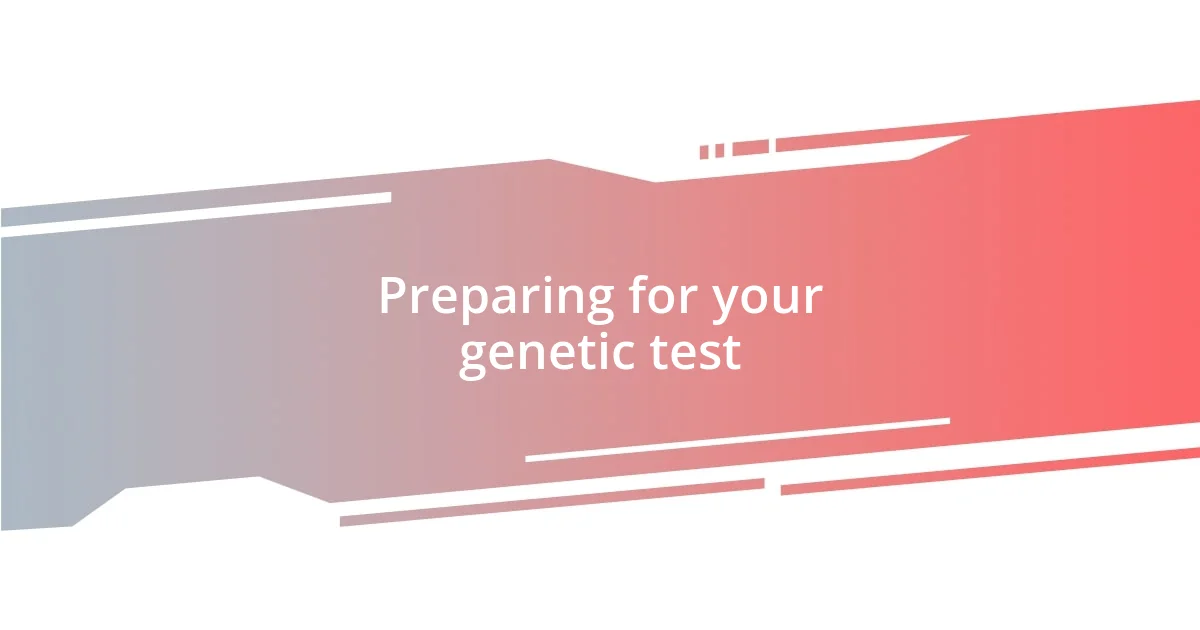
Preparing for your genetic test
Preparing for your genetic test involves careful thought and planning. I recall sitting down with a notepad, jotting down questions that swirled in my mind. It felt like preparing for a big exam—what would the results reveal? What emotions would they stir? Taking time to journal my thoughts helped me clarify my expectations and anxieties.
I also found it beneficial to assemble a support system before the test day. Having family or friends who understood the implications of what I was about to undertake was invaluable. I remember having long conversations with my sister, who had gone through the process herself. We shared our hopes and fears, making it a more manageable experience as we leaned on one another.
Lastly, familiarizing myself with the testing process really helped calm my nerves. I browsed trusted websites and read about others’ experiences, which made me more comfortable. Learning about what to expect—the sample collection, the timeline for results, and potential emotional outcomes—was like turning the lights on in a dim room. With the right mindset, preparation, and support, I felt ready to embrace this transformative journey.
| Preparation Tip | Details |
|---|---|
| Journaling | Write down questions and feelings to clarify your thoughts. |
| Support System | Engage family or friends for emotional backing. |
| Research | Familiarize yourself with the testing process and others’ experiences. |
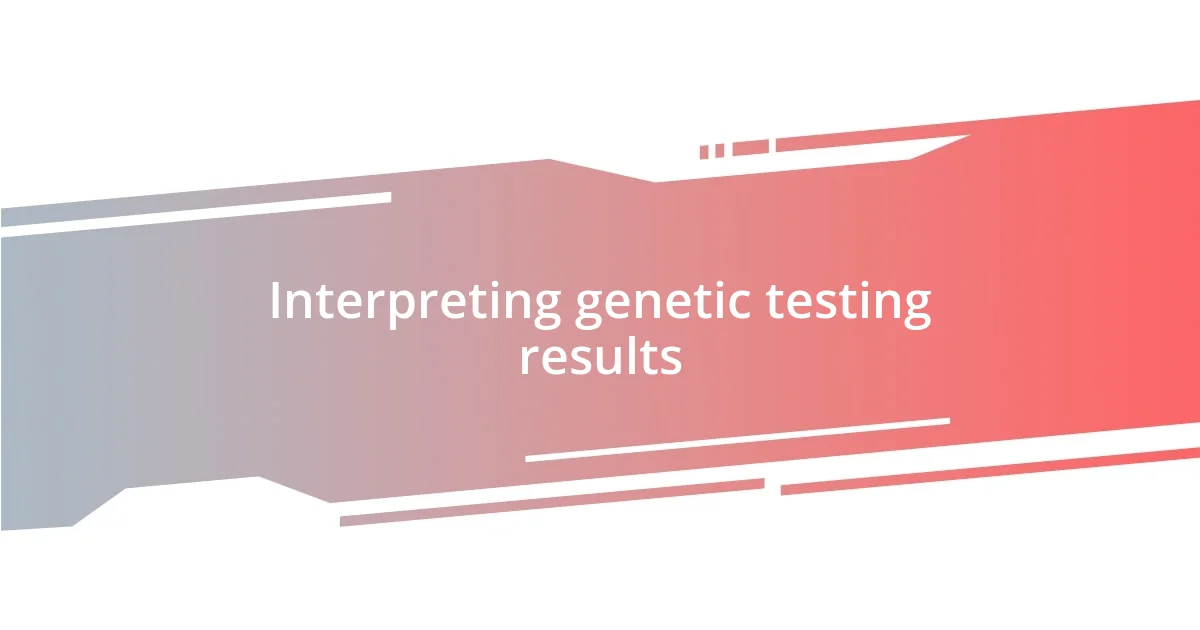
Interpreting genetic testing results
Interpreting genetic testing results can sometimes feel like deciphering a secret code, especially when you consider how much information is packed into a single report. I remember the moment I opened my results—my heart raced as I scanned the pages, unsure of what I would find. Each section offered insights into potential health risks and inherited traits, but understanding these implications took time and reflection.
I found it incredibly helpful to break down the complex terminology into bite-sized pieces. Terms like “variant” and “genotype” can sound intimidating, but essentially, a variant simply indicates a difference in your DNA that may or may not affect your health. Rather than overwhelming myself, I decided to tackle one section at a time. Even jotting down notes helped me connect the dots. By summarizing what each part meant, I felt more empowered to discuss my results with my healthcare provider.
Collaboration with my doctor proved vital in translating results into actionable health strategies. When I first shared my findings, I worried I might overlook something crucial. But my doctor patiently guided me through the nuances—helping me understand not just what the data said, but what it meant for my future. I left that appointment with a clearer sense of direction, feeling like I had turned a confusing jigsaw puzzle into a cohesive picture that revealed my unique health narrative. This holistic approach truly made a difference in my journey toward better health.
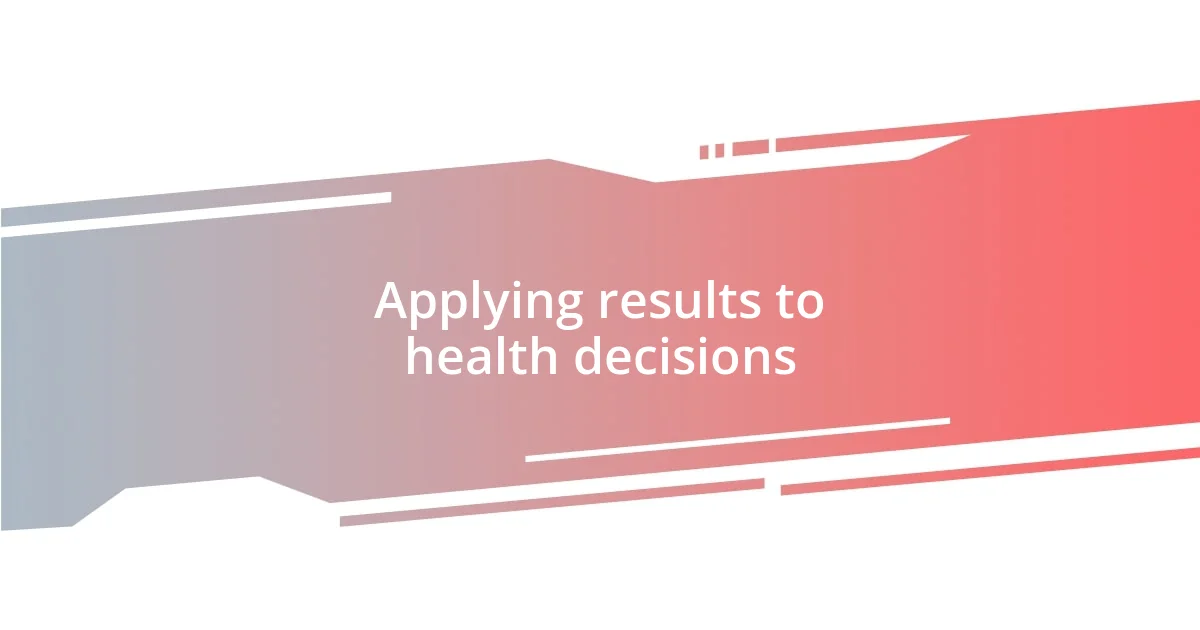
Applying results to health decisions
Making health decisions based on genetic testing results can be both enlightening and daunting. I recall feeling a mix of excitement and anxiety when contemplating the steps I could take after processing my findings. How could I turn this wealth of information into real action? This question lingered in my mind as I began focusing on preventive measures tied to my genetic predispositions.
One of the most impactful choices I made was to incorporate regular screenings and proactive lifestyle adjustments. For instance, knowing I had a genetic predisposition to high cholesterol prompted me to reevaluate my diet. I started exploring new recipes filled with heart-healthy ingredients and even took a cooking class, which not only transformed my eating habits but also reignited my passion for culinary creativity. Did I expect my food choices to change my life? Not entirely. But I was pleasantly surprised by how much better I felt, both physically and mentally.
Moreover, I learned the importance of ongoing dialogue with my healthcare team about my results. I remember discussing personalized exercise plans tailored to my genetic markers. This approach made every workout feel purposeful rather than a chore. I found myself thinking, “What if these small, tailored changes could have a lasting impact?” That sense of ownership and tailored approach to my health empowered me to take charge and embrace the changes wholeheartedly. Genetics gave me insights; my decisions translated those insights into tangible steps toward better health.
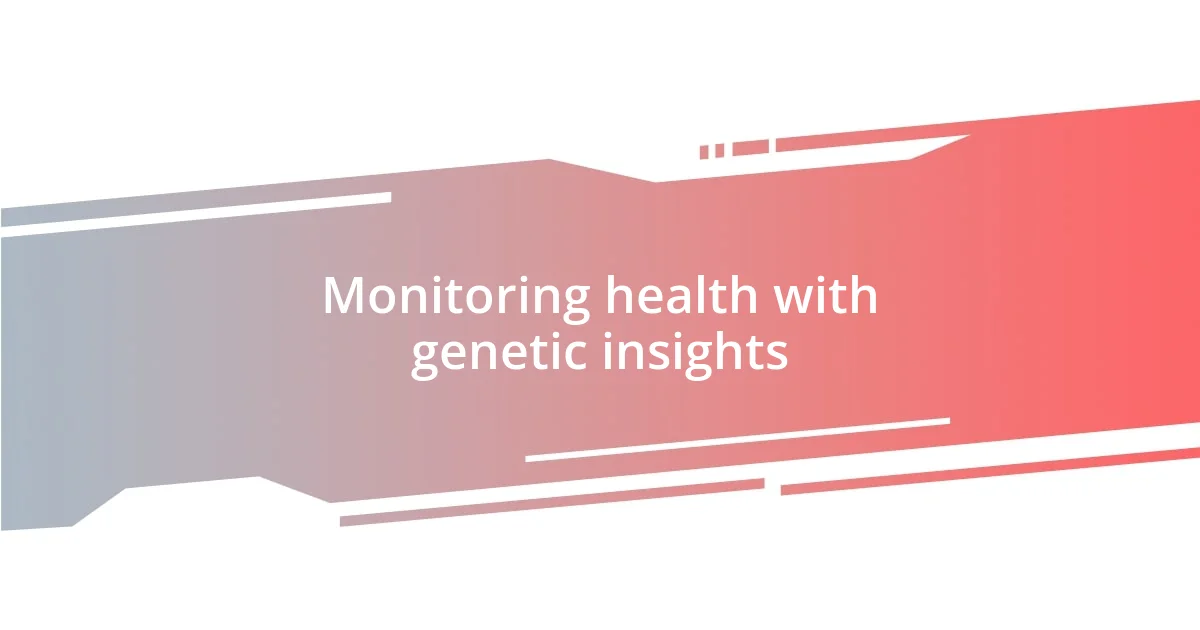
Monitoring health with genetic insights
Understanding how to leverage genetic insights for health monitoring can significantly influence one’s well-being. I still remember reviewing my genetic profile, realizing it wasn’t just a sheet of numbers but a roadmap that outlined what to keep an eye on. Did my family history prepare me for some of these insights? Absolutely! Knowing which conditions I should monitor helped me feel more in control of my health journey.
After some reflection, I decided to implement a regular monitoring routine for key health markers suggested by my genetic testing. For example, with insights indicating a potential risk for certain heart conditions, I began tracking my blood pressure more frequently. Each time I recorded my readings, I felt a mix of vigilance and empowerment. It transformed a once mundane chore into a meaningful practice. How fascinating it was to see that my proactive measures were, indeed, paying off.
Engaging in lifestyle choices was only part of the equation; I also started utilizing various health apps to track my genetic-related health metrics. It was like having a digital assistant reminding me of what I needed to monitor. I vividly remember the moment I received an alert about a scheduled check-up based on my risks, prompting me to book that appointment without hesitation. There’s something to be said about having an external reminder—knowing that my health insights were not just abstract data points, but represented genuine steps toward a healthier life.










